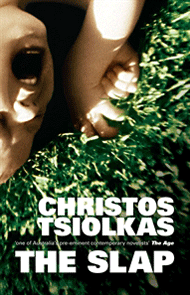Review of The Slap by Christos Tsiolkas

I had mentioned that this was my book recommendation for summer reading. It has won several awards. However, as I started the book I started regretting my mention of it, because I have never read a book so explicit in its language and description of sexual scenes.
This book has been celebrated as being at the forefront of the new genre of domestic realism. It is a book about middle class domestic life where nothing much happens. No great romance, no murder, no mystery, no horror… just a description of daily living.
It was the winner of both the 2009 Commonwealth Writer's Prize, and the Australian Book Industry Book of the Year. Tsiolkas has been heralded as "one of Australia's pre-eminent contemporary novelists".
There is a lot that is promising in this novel. It is well-written, the characters are interesting and it has a fascinating premise: a number of families are gathered for a BBQ, a child acts up and is disciplined (the "slap" of the title) but not by one of his parents.
Tsiolkas does well to sustain the story for almost 500 pages on such an ordinary premise. He achieves that by skilfully weaving together first person accounts from those who witnessed the event. The accounts cover a variety of age, gender, cultural, religious and sexual orientation viewpoints.
This allows Tsiolkas to examine a number of different themes:
"¢ parenting techniques
"¢ the impact on values of family or cultural background and life choices
"¢ the affect of adultery, drugs, alcohol and even smoking on family life.
This book had me talking to others about the controversies raised.
However, there are also some disappointments. The amount of swearing, sexual activity and drug taking does not match my experience of middle class Australia, although I admit to being sheltered by my Christian faith and community connections.
In some ways even though several of the viewpoints are from women, they seem to have a male agenda, particularly in relation to satisfying the male sexual appetite. More disturbingly, a woman decides to have an abortion with no consultation, not even with the foetus' father, ostensibly for her "freedom" but also for the sake of his career.
Additionally, the sexual scenes are described in a particularly graphic way, with an emphasis on male rather than female satisfaction.
Maybe I am naive, and 17-year-old kids are taking drugs with the consent and assistance of their parents and carers, with no qualms or questions, but I really hope this is not true.
Although there is some defence of marriage as an institution, it seems that this is only possible if wives accept that their husbands will be unfaithful, or alcoholic, or workaholic, or abusive, and quietly go about the business of virtually single-handedly raising the children and caring for the house; as well as contributing to the family income.
There is some expression of religious values, with Islam presented as the more holistic and healthy version. The reference to Catholic and Orthodox faith is in terms of having a god who gives you want you want, or you curse him.
Just when I decided that this depiction of the new Australian middle class was simply a frightening place for women… my reading group had a discussion which raised the possibility that the author is doing something much more subtle than I had picked up. The book was described as a modern morality story, Dickensian in style. In the postmodern version of a Dickens novel it is the reader that decides the ethics; there is no easy resolution with the author bringing the bad guys to justice.
Tsiolkas has written elsewhere about justice and tolerance in society, so perhaps the reader is meant to be appalled rather than simply accept the behaviour of some of the protagonists. Regardless, this is a provocative book; and a great conversation starter.
KARA MARTIN is a lecturer with School of Christian Studies (www.socs.org.au), and is an avid reader and book group attendee. Kara does book reviews for Hope 103.2's Open House (www.theopenhouse.net.au)






















